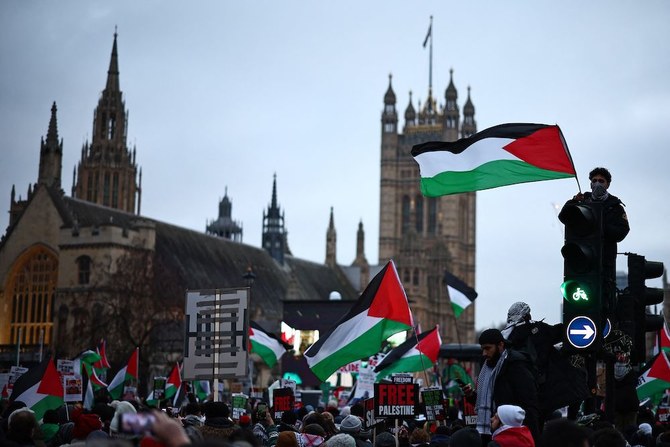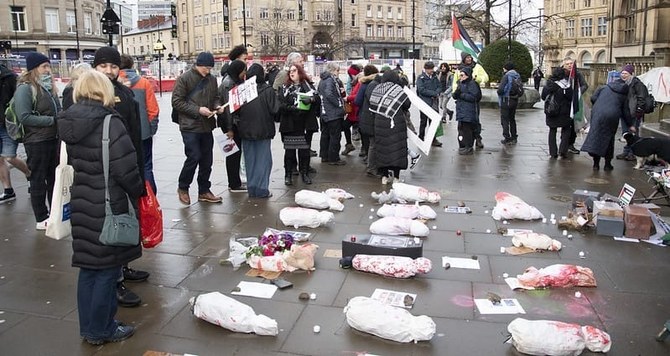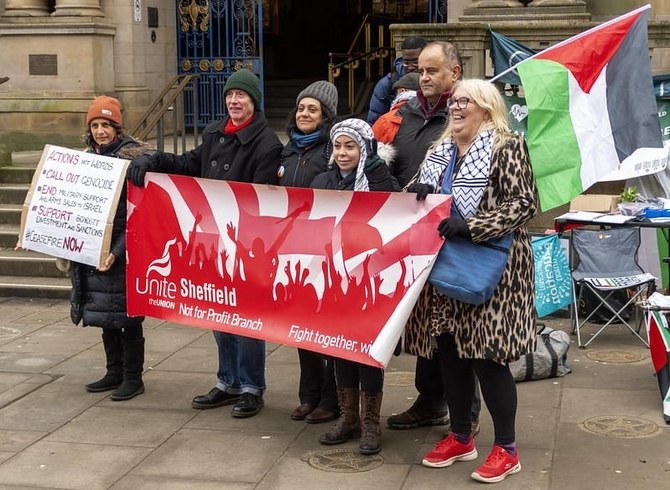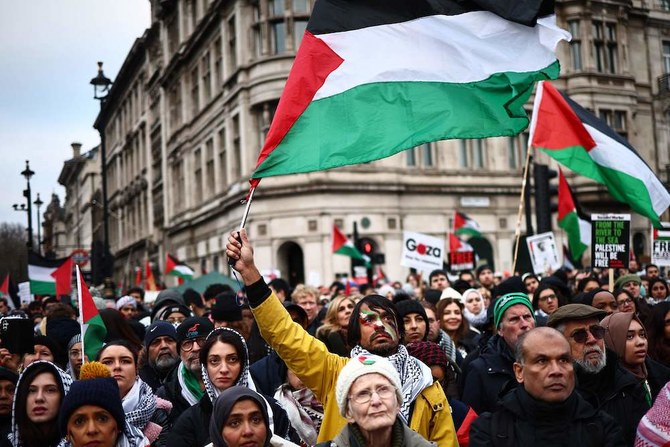LONDON: Hundreds of thousands of pro-Palestine protesters marched in central London on Saturday as part of a global day of action to oppose Israel’s bombing campaign in Gaza.
The day was organized by a coalition including the Friends of Al-Aqsa, Palestinian Forum in Britain, Stop the War Coalition, Campaign for Nuclear Disarmament, Palestine Solidarity Campaign and Muslim Association of Britain.
Around 1,700 police were on duty for the march, the latest in a series of demonstrations which have been held in London most Saturdays since the Israel-Hamas war began last year.
“The call of Jan. 13 designated by peace activists as a global day of action for Gaza has already attracted 40 countries organizing protests,” said Ismail Patel, chairman of the Friends of Al-Aqsa. He added Saturday was significant because it was the “eve of 100 days since the present crisis faced by the Palestinians. It is also a day after the International Court of Justice will deliver an interim order on the case brought by South Africa against Israel.”
The international court concluded two days of hearings on Friday. The proceedings by the South African government are also endorsed by other nations.
“With Israel continuing with its slaughter of Palestinians and most of the world’s governments remaining passive, peace activists are urging civil society to demand an immediate ceasefire and an end to occupation,” Patel said. “It is up to the people of the world to guide the political leaders and help end the genocide in Gaza.”
In a joint statement, the organizing coalition said: “Israel’s unrelenting attacks bear all the hallmarks of genocide under international law, as they demonstrate an ‘intent to destroy, in whole or in part, a national, ethnical, racial or religious group’.”
PSC director Ben Jamal said: “The world needs to charge Israel with the gravest of crimes — genocide — not just in the International Court of Justice, but in the court of global public opinion.
“In the face of the failure of governments, including the UK, to act to uphold international law and defend fundamental human rights, people continue to take to the streets to protest, week after week (and) this Saturday, from Australia to South America, from Dhaka to Washington, people of conscience will show the world demands a full ceasefire and an end to Israel’s impunity from international law,” he added.
Jamal said London was at the forefront of these global protests, attracting hundreds of thousands of solidarity campaigners “despite government hostility and opposition indifference.”
He said the national march continued to “show the majority of British people stand with Palestinians in this dark hour of their decades of oppression.”
He added: “A permanent ceasefire must be the starting point to address the underlying causes, including Israeli military occupation and a system of oppression against the Palestinian people that is considered internationally to meet the legal definition of apartheid. We will continue to march, demonstrate and organize to demand justice for the Palestinian people.”
“Little Amal,” a giant puppet of a refugee child that has become a global symbol of human rights, joined the seventh demonstration on Saturday, accompanied by a group of Palestinian children.
“Little Amal is a global symbol of human rights and the rights of children in particular. The name Amal means ‘hope’ in Arabic,” said a PSC spokesman.
“She represents a nine-year-old Syrian refugee girl who travels alone across Europe to find her mother (and) was created in 2021 for a project in which she walked between the Syrian-Turkiye border and the UK to draw attention to the experience of refugees. Since then she has traveled the world and met millions of people.”
Palestinian Amir Nizar Zuabi, artistic director of The Walk Productions, said: “Amal has become a symbol of the vulnerability and resilience of the millions of people that met her or followed her journey.”
He said the 12-foot puppet “walks for those most vulnerable and for their bravery and resilience,” adding: “Amal is a child and a refugee and today in Gaza childhood is under attack, with an unfathomable number of children killed. Childhood itself is being targeted. That’s why we walk.”
Israel’s bombardment of the Gaza Strip has claimed the lives of more than 23,000 Palestinians, including more than 10,000 children. Thousands more are missing or presumed dead. Almost all of Gaza’s population has been displaced, with more than 60 percent of buildings damaged or destroyed. The UN has warned one in four people in Gaza are starving as Israel refuses to allow in adequate supplies and destroys food infrastructure.
The day of action involved over 40 countries across six continents, including the UK, US, Canada, France, Germany, Switzerland, Denmark, South Africa, Nigeria, Ghana, Japan, Indonesia, South Korea, Australia, Brazil, Jordan, and Turkiye.
Meanwhile, pro-Palestinian activists in the northern city of Sheffield continued a campaign of solidarity with the Palestinian people for the ninth consecutive day with a sit-in camp in front of the town hall.
Organized with the support of the Sheffield Coalition Against Israeli Apartheid, the Justice Now Camp included activities calling for an end to the conflict and condemning the crimes and violations committed by Israel against the Palestinian people.
Models of shrouds covered in blood and expressive shrines were placed outside the makeshift camp. The activists also called on the city council to declare Sheffield an “Israeli apartheid-free zone” and for criminal charges to be brought against British individuals who joined the Israeli Defense Forces and committed genocide in Gaza.
Two Palestinian activists, Sahar Awadallah and Lena Mussa, have been on hunger strike since the start of the camp to convey to the British community the enormity of the tragedy and humanitarian catastrophe.






















